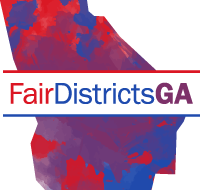Princeton Gerrymandering Project and Fair Districts Georgia Announce Partnership
PRINCETON, New Jersey / ATLANTA, Georgia – The Princeton Gerrymandering Project (PGP) and Fair Districts Georgia (FDGA) are pleased to announce they have entered into a partnership to encourage nonpartisan redistricting in Georgia, combining the PGP’s expertise in law, data, and math with FDGA's deep knowledge of state politics, activism, and history of advocacy.
2021 is a crucial year in the Constitutionally-mandated decennial redistricting cycle. PGP and FDGA recognize the need for developing technologically savvy, politically unbiased solutions to the problem of gerrymandering. The PGP-FDGA partnership brings together deep skills in scholarship, organizing, and technology to support the drawing of fair districts in Georgia's General Assembly.
Advocates and experts agree: the state of Georgia has been the subject of near-constant gerrymandering for two decades. Weak standards in the state constitution give elected legislators wide latitude to draw redistricting plans that favor the majority party. With Georgia emerging as a swing state in the 2018 and 2020 elections, the 2021 redistricting cycle presents an opportunity to create a fair and representative Congressional delegation and state legislature. If fair districts are established in Georgia, the feedback loop of gerrymandering can be broken.
Operating at the intersection of law, math, and political science, PGP (gerrymander.princeton.edu) is dedicated to reforming redistricting nationwide. PGP’s state-of-the-art tech uses existing maps and election results to analyze redistricting plans in real-time. Using 2020 census data, PGP will create benchmarks for fair electoral maps that can be used to evaluate proposed maps drawn by the Georgia state legislature. Experts have submitted similar analyses as testimony in significant anti-gerrymandering litigation in federal and state courts.
Fair Districts GA is the sole nonpartisan organization in Georgia focused exclusively on fighting gerrymandering, the practice of drawing legislative district lines to favor one group over another. FDGA's ultimate goal is to reform Georgia’s process for drawing state and federal electoral maps. FDGA supports stronger standards and a nonpartisan, transparent, accountable redistricting process.
“The PGP-FDGA partnership can help Georgians from all walks of life draw maps that favor Georgia voters, not political parties," said Jason Rhode, national coordinator of the PGP. "FDGA's understanding of Georgia politics, and their demonstrated commitment to even-handed reform, make them the ideal partner for change in Georgia."
“Our partnership will bring to Georgia, for the very first time, sophisticated analysis techniques that can guide the drawing of fair legislative maps,” said Ken Lawler, Chair, FDGA. “We look forward to providing this information to the Georgia General Assembly in support of their redistricting efforts this year.”
To arrange an interview, contact:
Jason Rhode, PGP National Coordinator, or Cuffy Sullivan, FDGA Communications Chair.
